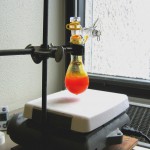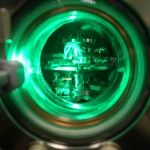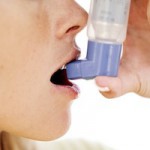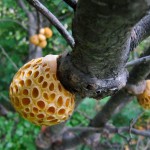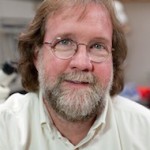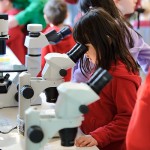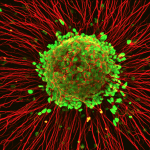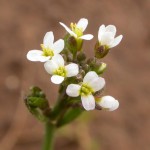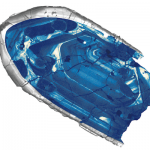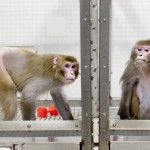Category Science & Technology
De-extinction: Will dead species live again?
De-extinction is a recent term that involves bringing back an extinct species using DNA that’s been recovered from preserved material. There are two ways that it can be accomplished: one would be cloning to produce a copy of an extinct individual’s genome. The second way is through genetic engineering to re-create a close approximation of what the extinct species’ genome might have once been. The reality is that it’s no longer science fiction. We’re getting close to being able to revive extinct species from recovered DNA.
It’s not all wedded bliss: Marital stress linked to depression
Marital stress may make people more vulnerable to depression, according to a recent study by University of Wisconsin–Madison researchers and their colleagues.
Lighting up the lab: Team harnesses light for controlled chemical reaction
When chemist Tehshik Yoon looks out his office window, he sees a source of energy to drive chemical reactions. Plants “learned” to synthesize chemicals with sunlight eons ago; Yoon came to the field a bit more recently. But this week, in the journal Science, he and three collaborators detail a way to use sunlight and two catalysts to create molecules that are difficult to make with conventional techniques — a finding that may eventually have implications for drug making and materials science.
Annual Wisconsin Stem Cell Symposium to focus on blood
World stem cell leaders will converge on Promega's BioPharmaceutical Technology Center in Fitchburg on April 30 for the 9th Annual Wisconsin Stem Cell Symposium: From Stem Cells to Blood.
UV light-emitting bandage wins Qualcomm Innovation Prize
A smart, ultraviolet therapeutic bandage won the top prize and $15,000 at the 2014 Qualcomm Innovation competition at UW–Madison. The Power Wearables team of biomedical engineer Mehdi Shokoueinejad, electrical and computer engineers Akshay Kumar and Yei-Hwan Jung created the MicroViolet Patch to combine phototherapy with a typical adhesive bandage.
UW-Madison’s Gourse elected to American Academy of Arts and Sciences
University of Wisconsin–Madison bacteriologist Richard L. Gourse is among leaders from academia, business, public affairs and the arts and humanities elected to membership in the American Academy of Arts and Sciences, it was announced today (Wednesday, April 23).
First in the nation: UW–Madison establishes post-doc in feminist biology
Feminist biology - which attempts to uncover and reverse gender bias in biology - will be the focus of a new, endowed fellowship in the Department of Gender and Women's Studies at the University of Wisconsin–Madison.
Made-in-Wisconsin atom probe assisted dating of oldest piece of earth
It's a scientific axiom: big claims require extra-solid evidence. So there were skeptics in 2001 when University of Wisconsin–Madison geoscience professor John Valley dated an ancient crystal found in Australia to 4.4 billion years ago. The date, after all, was only 100 million years after Earth started to solidify from a ball of molten rock.
TIP/White-nose Syndrome affecting bats in Wisconsin
4/16/14TO: Media representativesFROM: Nik Hawkins, nihawkin@vetmed.wisc.edu, 608-263-6914RE: TIP/WHITE-NOSE SYNDROME AFFECTING BATS IN WISCONSIN
Hair from infants gives clues about their life in the womb
Like rings of a tree, hair can reveal a lot of information about the past.
Research team to search for new antibiotics from untapped microbes
Facing an imminent global public health crisis, a University of Wisconsin–Madison research team has been awarded up to $16 million from the National Institutes of Health to find new sources of antibiotics to combat the rising number of deadly antibiotic-resistant infections.
Wisconsin research shows green space keeps you from feeling blue
If you start feeling better as spring begins pushing up its tender shoots, you might be living proof of a trend discovered in data from the Survey of the Health of Wisconsin: The more green space in the neighborhood, the happier people reported feeling.
Scientists firm up origin of cold-adapted yeasts that make cold beer
As one of the most widely consumed and commercially important beverages on the planet, one would expect the experts to know everything there is to know about lager beer.
“Your Inner Fish,” with strong UW connections, premieres on PBS
A University of Wisconsin–Madison professor wants to help more people get to know their ancestors.
Study helps unravel the tangled origin of ALS
By studying nerve cells that originated in patients with a severe neurological disease, a University of Wisconsin–Madison researcher has pinpointed an error in protein formation that could be the root of amyotrophic lateral sclerosis.
How plants adapt: Calcium waves help the roots tell the shoots
For Simon Gilroy, sometimes seeing is believing. In this case, it was seeing the wave of calcium sweep root-to-shoot in the plants the University of Wisconsin–Madison professor of botany is studying that made him a believer.
Oldest bit of Earth’s crust among attractions at Geology Museum open house
It promises to be a trip through geologic time: from a look at the oldest piece of Earth's crust, to the earliest smells on our planet, to a recently crash-landed Martian meteorite.
Monkey caloric restriction study shows big benefit; contradicts earlier study
The latest results from a 25-year study of diet and aging in monkeys shows a significant reduction in mortality and in age-associated diseases among those with calorie-restricted diets. The study, begun at the University of Wisconsin–Madison in 1989, is one of two ongoing, long-term U.S. efforts to examine the effects of a reduced-calorie diet on nonhuman primates.


